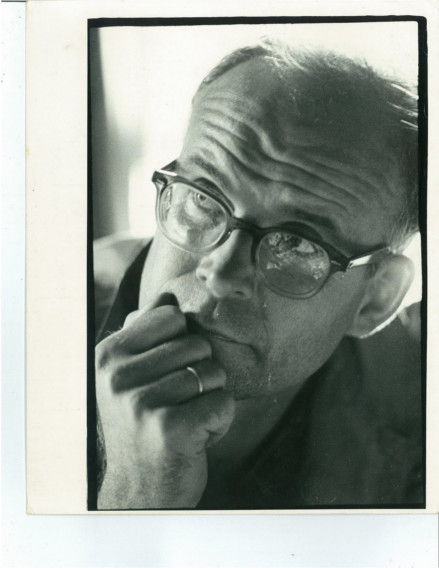Vine City and Hector Black

The story of Hector Black unfolded in three years in the heart of the 1960s. His unceremonious arrival in Vine City in 1964 would be followed by national magazine features of him in 1966 and, abruptly, his hasty departure in 1967. The three-year tale falls into a much longer plot - still ongoing - that relates to the significance of local activism and the insider/outsider distinction in Vine City.
In 1964 Black, his wife, and their three children moved to Atlanta. They bought a house at 560 Magnolia Street and began community organizing in Vine City. "If you are here 24 hours," he explained, "you see things you don't see if you're just in and out. You've got to feel more and more what other people are putting up with, see the injustices" (Look).
In 1966 Black gained national attention through profiles in Newsweek and Look magazines. Journalists depicted Black as an odd but golden-hearted outsider. Newsweek described the 41-year-old as "a soft-spoken Brooklyn-born Quaker and a Harvard honors graduate" (Newsweek). The articles focused especially on his background: hitchhiking in Israel, working for six weeks on a kibbutz, helping a Catholic service organization in New York's bowery neighborhood, and living in Paraguay with the Society of Brothers ("a religious sect whose members share work and property in common," Look). He did all of this while serving in World War II. "While I was in the Army," Black said, "I became more and more troubled by social injustices" (Look). This interest in social justice landed him in Vine City.
The July issue of Newsweek wrote that "When Hector Black arrived in Atlanta seventeen months ago, he promptly moved into the tottering, tar-papered Negro slum called Vine City-and almost as promptly got Vine City moving. Black helped his new neighbors organize a militant citizens' action group, counseled them through sally after sally against the ghetto's absentee political and economic establishment" (Newsweek). These articles - which delighted in playing with Hector's last name and his white race through headlines like "White Power" or "Black [as in his last name] Power" - portrayed him as the savior of Vine City.
The articles highlight Black's founding of the Vine City Council, which focused initially on "routine welfare and housing problems" (Newsweek) and his work with the Vine City Improvement Association. While distributing more than 300 blankets to families without heat in January 1966, Black was arrested for trespassing. He was released after 36 hours in Fulton County Jail. Look magazine quoted Atlanta Mayor Ivan Allen Jr.'s praise for Black: "'He's got guts. That damn guy has pushed the city into taking action we should have taken long ago" (Look 138).
The national periodicals seem particularly interested in Black's story because of the controversy that erupted, seemingly, because of his race. Newsweek wrote that Black's whiteness "affronted the new Black Power purists of the ultramilitant Student Nonviolent Coordinating Committee" (Newsweek). SNCC leaders are quoted as critiquing Black as a "white Jesus" and a "master." The articles describe Black's measured response to these critiques. SNCC representatives are displayed as radical militants, though the articles do not reference specific figures or explore their perspectives.
The Look magazine profile ends with praise: "Hector Black practices in Vine City what life has taught him elsewhere. When he leaves, which won't be soon, he will go to another slum. 'I identify with people on the bottom,' he admits. 'I've had a lot of opportunity and advantages. You're born where you're born without choosing, and because things are the way they are, you'll probably stay where you're born-despite the American Dream.' Hector Black didn't stay where he was. And, if he finds a way, neither will the people on the bottom" (Look).
But Black would leave Vine City very soon.
On August 9, 1967, the third issue of the locally-produced Vine City Voice devoted nearly a full page to the story of the Blacks' departure. The headline read: "Good-bye Vine City" and the text was a letter Black himself had penned explaining his reasons for leaving. The letter is reproduced below, and the sections in bold are of particular interest:
"We want to express to all our friends here in Vine City how much we appreciate the Friendship and love you have shown to us since we first moved here 2.5 years ago. Vine City has some of the nicest people we have ever met, and we are going to miss you when we move away. The reason why we are going is that we feel it is time for the people of Vine City to speak for themselves-not that people here haven't spoken out before we came-but too much of the credit for the changes made here has been given to us, and not enough to all of you who live here and who fought for these changes. We want to encourage all of you to join the Vine City Council, and to work together and speak your mind in the meetings. The Council was established to speak for the community and if it doesn't, it's your fault if you're not coming to meetings. We are going to a small school in Pennsylvania, and our address will be: Pendle Hill, Wallingford, Pennsylvania, 19086. We'll look forward to letters from anyone who cares to write. Some people have told me about a rumor that it is Black Power and the Nitty Gritty that are making us move. This is not true. We are moving because we feel it is the right thing to do. I'm a stubborn guy and if anyone tried to push me to move, as they did last summer, I would be more likely to stay. We want to say again, thank you for the way you accepted our family in your community. It seems we are still a long way from equality of black and white, and real acceptance of one another as human beings equal before God. You accepted us, but the white man does not yet accept you. If we don't come back here except for a visit, you can be sure that we will be working for justice and brotherhood somewhere else, and we will always carry with us the memory of the joys and sorrows, the hate and pain, but above all, the love which we experienced here" (The Vine City Voice, Volume 3, no. 3 August 9, 1967)
In the end, what prompted the "stubborn" Hector Black to leave Vine City? While he claimed that personal reasons, rather than outside pressure, motivated him to move, the story may be more complicated. During Black's last year in Vine City, the SNCC became increasingly vocal against him. Although many community leaders continued to support him, the escalating pressure from groups like the SNCC may have influenced his decision to relocate.

